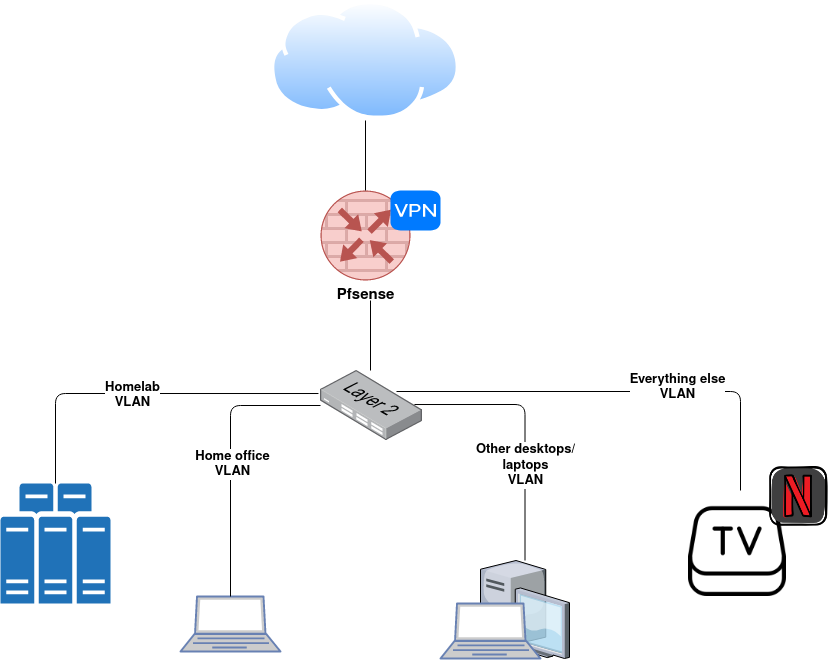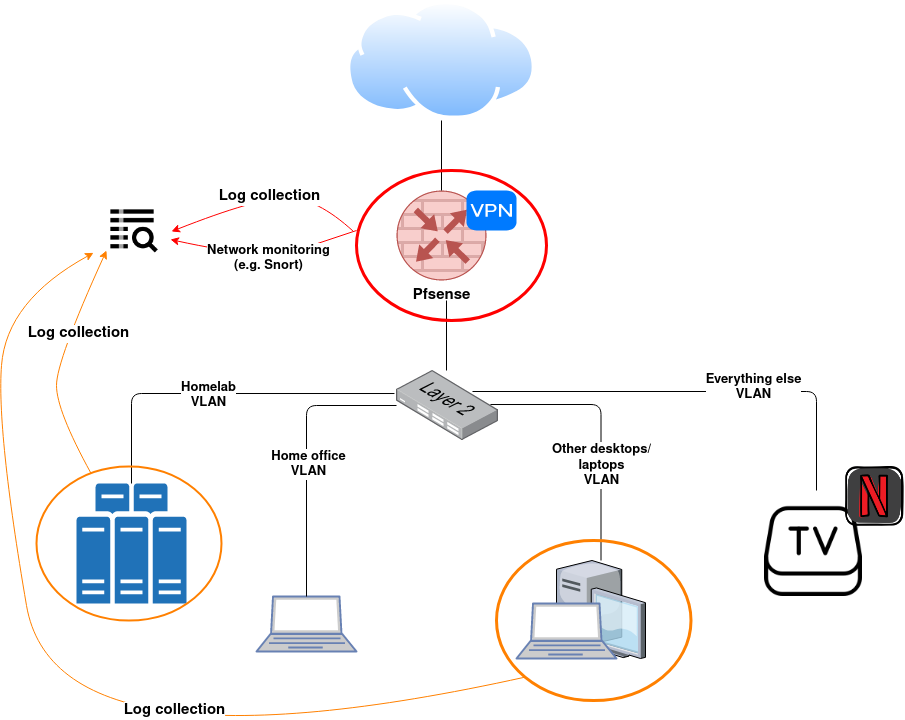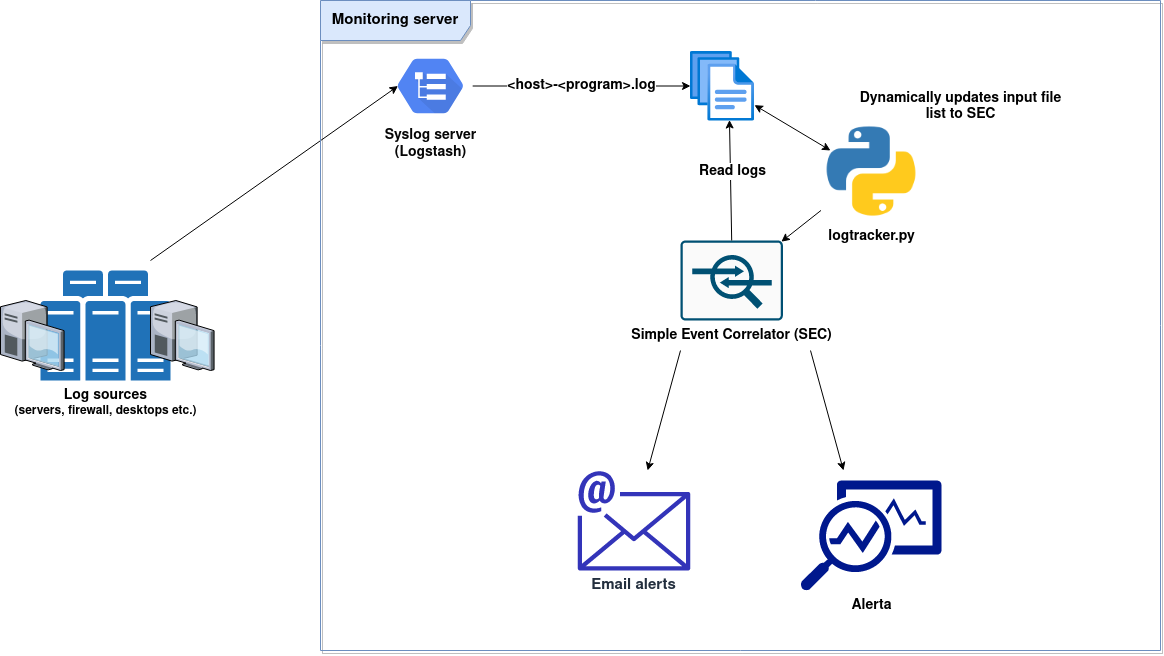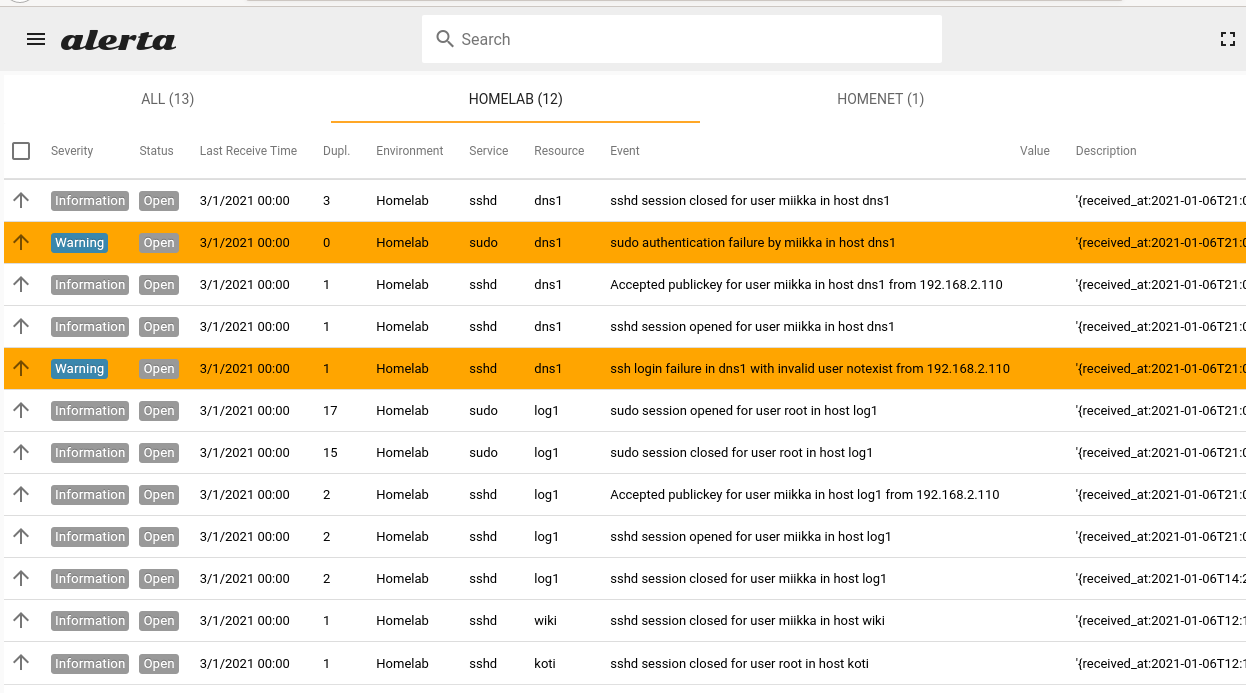Centralized log collection and monitoring
From time to time, I get inspiration to tinker with monitoring my home network. Sometimes I want to test some new features in an existing solution or some new technology. Usually, it ends with some corporate-level setup that is nice for a while, but eventually, I don’t have time or interest to manage all that in my free time. Recently I have tried to implement an approach that is a bit better suited for home lab tinkering. This post is not a detailed step-by-step guide to do what I do, but more like an overview of my setup.
The environment that I’m monitoring looks somewhats like this:

I can collect logs from the firewall, homelab servers, other desktops/laptops than work-related ones, and from a few other devices. If some smart TV offers some logging, then sure, but usually no.
The firewall is one quite obvious item to monitor closely. Servers in the homelab network are not such a high-level target. Yes, I want to monitor those for SSH logins and such. However, when someone takes SSH or other connections there, things have already gone pretty south as there are no services exposed to the internet and only limited exposure to other VLANs.
With the home office network, I can only do network-level monitoring, but devices in that network should anyways be in Zero Trust level and monitored by someone else.

Architecture
The main building blocks are the following..
- Rsyslog: event forwarding in log sources
- Logstash: centralized log server
- Simple Event Correlator (SEC): event correlation.
- Alerta: monitoring
.. and the overall architecture will be something like this:

Deployment
I will show an overview of the deployment and will briefly explain the configurations I have.
Logstash (Syslog server)
- Logstash installation: https://www.elastic.co/guide/en/logstash/current/installing-logstash.html
- Configuration:
- I’m going with a very minimal setup without any changes in
/etc/logstash/logstash.yml. - In
/etc/logstash/jvm.optionsI have set memory options-Xms1gand-Xmx3g, so the initial heap size is 1GB and maximum is 3GB.
- I’m going with a very minimal setup without any changes in
The basic Logstash deployment concept includes one or more inputs to receive some log events, usually filters to parse those events and outputs to send or write the filtered events somewhere.
These configurations can be split into multiple files and eventually can be more structured with pipelines. I’m using a simple setup where input, filter, and output are in a single file.
- Content of
/etc/logstash/conf.d/logstash-syslog.conf:
The input section specifies TCP and UDP listeners for syslog data.
input {
tcp {
port => 51444
type => syslog
tags => ['syslog']
}
udp {
port => 51444
type => syslog
tags => ['syslog']
}
}
The filtering section does some content parsing, but almost all is for potential future use. The only one used now is the “syslog_program” field that I use in the output section.
filter {
if [type] == "syslog" {
grok {
match => {
"message" => [ "%{SYSLOGTIMESTAMP:syslog_timestamp} %{DATA:syslog_program}(?:\[%{POSINT:syslog_pid}\])?: \[%{DATA}\] %{DATA:snort_event} \[Classification: %{DATA:snort_classification}\] \[Priority: %{NUMBER:snort_priority}\] \{%{DATA:snort_protocol}\} %{IP:snort_src_ip}:%{POSINT:snort_src_port} -> %{IP:snort_dest}:%{POSINT:snort_dest_port}",
"%{SYSLOGTIMESTAMP:syslog_timestamp} %{SYSLOGHOST:syslog_hostname} %{DATA:syslog_program}(?:\[%{POSINT:syslog_pid}\])?: /usr/bin/rsnapshot( -v)? %{DATA:rsnapshot_event}: %{GREEDYDATA:rsnapshot_output}",
"%{SYSLOGTIMESTAMP:syslog_timestamp} %{SYSLOGHOST:syslog_hostname} %{DATA:syslog_program}(?:\[%{POSINT:syslog_pid}\])?: %{GREEDYDATA:syslog_message}",
"%{TIMESTAMP_ISO8601:syslog_timestamp} %{SYSLOGHOST:syslog_hostname} %{DATA:syslog_program}(?:\[%{POSINT:syslog_pid}\])?: %{GREEDYDATA:syslog_message}",
"%{SYSLOGTIMESTAMP:syslog_timestamp} %{DATA:syslog_program}(?:\[%{POSINT:syslog_pid}\])?: %{GREEDYDATA:syslog_message}"]
}
add_field => [ "received_at", "%{@timestamp}" ]
add_field => [ "received_from", "%{host}" ]
}
}
if [rsnapshot_event]{
mutate {
add_tag => [ "rsnapshot" ]
}
}
if [snort_event]{
mutate {
add_tag => [ "snort" ]
}
}
}
The output section, in this case, specifies the output file. The previously mentioned syslog_program variable and the host variable will construct the output log file.
You may notice that if statements in output and filter sections are pretty useless as I only have one input that sets the syslog tag. Those if statements are mostly specified because of habit to do this when Logstash configuration is far more complex, but also it gives a sort of pre-defined structure in a case I want to expand the configuration with some other tag based filtering or outputs.
output {
if "syslog" in [tags] {
file {
path => "/srv/logstash/%{host}-%{syslog_program}.log"
}
}
}
Note that the directory path in path => needs to exist beforehand and it needs to have permissions which allows the logstash service user to create files into it. For example: sudo mkdir /srv/logstash/ && sudo chown logstash /srv/logstash/ && sudo chmod 750 /srv/logstash/.
Log sources
Log sources will have just a basic rsyslog forwarding setup. In case you are more familiar with ELK stack installations, you may be wondering why I’m not using beats agents. For now, I want this setup to work even if I would have just a regular rsyslog server that replaces Logstash. Logstash is currently only providing an easy possibility to expand the installation if I feel like I have a reason and time to do that at some point.
In rsyslog configurations of log sources I have basically just added a line *.* @@<logstash server>:51444 to /etc/rsyslog.conf. This forwards everything to Logstash using TCP.
Alerta
- Alerta installation: https://docs.alerta.io/en/latest/quick-start.html
I’m running Alerta behind Nginx (Nginx -> uwsgi -> Alerta). You can find full deployment tutorial here.
Here’s my location configuration for the Nginx site:
location /api { try_files $uri @api; }
location @api {
include uwsgi_params;
uwsgi_pass unix:/run/uwsgi/uwsgi.sock;
proxy_set_header Host $host:$server_port;
proxy_set_header X-Real-IP $remote_addr;
proxy_set_header X-Forwarded-For $proxy_add_x_forwarded_for;
}
location / {
root /var/www/html;
try_files $uri $uri/ /index.html;
}
uwsgi.ini configuration:
[uwsgi]
chdir = /var/www
mount = /api=wsgi.py
callable = app
manage-script-name = true
env = BASE_URL=/api
master = true
processes = 5
logger = syslog:alertad
socket = /run/uwsgi/uwsgi.sock
chmod-socket = 664
uid = www-data
gid = www-data
vacuum = true
die-on-term = true
Content of wsgi.py:
from alerta import create_app
app = create_app()
Systemd service that is running the uwsgi service looks like this:
[Unit]
Description=uWSGI service
[Service]
ExecStartPre=/bin/bash -c 'mkdir -p /run/uwsgi; chown www-data:www-data /run/uwsgi'
ExecStart=/usr/local/bin/uwsgi --ini /etc/uwsgi.ini
[Install]
WantedBy=multi-user.target
The documentation for Alerta server configuration can be found here: https://docs.alerta.io/en/latest/configuration.html.
Simple Event Correlator
SEC is an event correlation tool for advanced event processing which can be harnessed for event log monitoring, for network and security management, for fraud detection, and for any other task which involves event correlation.
– https://simple-evcorr.github.io/
I’m using quite simple SEC rules to catch some patterns and do actions based on them. SEC can, however, do far more powerful event correlation. See its man page for more information.
Usage example
Here’s a really simple SEC usage example:
- Create a file
/tmp/rules.confwith the following content:type=SingleWithThreshold ptype=RegExp pattern=^Hello from (.*)$ desc=Listen for triple hello inside 5 seconds action=write - Triple hello! First one was $1 window=5 thresh=3The action is launched when three events matching the pattern appear inside 5 seconds.
- Launch SEC:
/opt/sec/sec --conf /tmp/rules.conf --input=/tmp/input.txt --reopen-timeout=5 - Launch command
for i in $(seq 1 3);do echo Hello from console$i;done >> /tmp/input.txtin a different terminal - You should see this in SEC’s output:
Triple hello! First one was console1
SEC’s man page has a bit more practical example which would monitor for failed SSH attempts. In this example you can also see more practical action:
type=SingleWithThreshold
ptype=RegExp
pattern=sshd\[\d+\]: Failed .+ for (\S+) from [\d.]+ port \d+ ssh2
desc=Three SSH login failures within 1m for user $1
action=pipe '%s' /bin/mail -s 'SSH login alert' root@localhost
window=60
thresh=3
Dynamic input files
In the previous usage example the input file was specified directly as a command line parameter. This is fine when you know and can specify all the files that should be monitored, but this wasn’t quite enough for my use-case.
The issue I had was that I wanted new hosts to be automatically monitored without manually updating SEC’s input files. Now, as my Logstash configuration creates files %{host}-%{syslog_program}.log I would need to know host-names that my future machines may have, or I would need to update input files for SEC when I add new hosts. Note that specifying something like --input=/srv/logstash/*-sshd.log does shell expansion and it will only include files that already exist, so it doesn’t help even with SEC’s reloading options.
The question 24 in SEC’s FAQ gave me a starting point to solve this. It shows how to handle timestamps in filenames, but I can leverage the same solution.
Below are sections from my SEC rules that provide this solution.
The first section of the configuration launches an external script logtracker.py when SEC is started. The script takes log file patterns as an input and string “WILD” presents wildcard (*) character in the patterns.
type=Single
ptype=RegExp
pattern=^(?:SEC_STARTUP|SEC_RESTART)$
context=SEC_INTERNAL_EVENT
desc=start log file tracker
action=cspawn LOGTRACKER /usr/local/bin/logtracker.py /srv/logstash/WILDsshd.log /srv/logstash/WILDsudo.log
type=Single
ptype=RegExp
pattern=^Open file (.+) (0|-)$
context=LOGTRACKER
desc=open logfile $1 and start reading from offset $2
action=addinput $1 $2
What this does is that the script will take those patterns and constantly keeps checking for new log files (1st rule) and returns found file paths back to the SEC which will then add those to input files (2nd rule).
This is the source of the logtracker.py script:
#!/usr/bin/python3
import sys
import glob
import time
files = []
for arg in sys.argv[1:]:
files += glob.glob(arg.replace('WILD', '*'))
for f in files:
print("Open file {} -".format(f), flush=True)
try:
while True:
files2 = []
for arg in sys.argv[1:]:
files2 += glob.glob(arg.replace('WILD', '*'))
for f in files2:
if f not in files:
print("Open file {} 0".format(f), flush=True)
files.append(f)
time.sleep(1)
except KeyboardInterrupt:
sys.exit(0)
Now I can add new hosts, configure rsyslog forwarding, and SEC will automatically pick-up log files of those hosts as well.
SEC ruleset
The below diagrams show two basic flows that I try to achieve with my SEC ruleset.
The first flow includes direct alerts that SEC creates based on matching rules.
sequenceDiagram
Title: Direct Alerta alerts
participant logs;
participant SEC;
participant Alerta;
participant email;
SEC->>logs: read log events
SEC->>SEC: rule match
SEC->>Alerta: info, warn, or critical events
Alerta->>Alerta: Alerta handles de-duplication
SEC->>email: critical or otherwise rare events
The second flow SEC sends Alerta hearbeat messages when a certain rule matches. The heartbeats will not cause an alert as long as a new heartbeat is sent before the specified timeout.
sequenceDiagram
Title: Alerta heartbeat alerts
participant logs;
participant SEC;
participant Alerta;
SEC->>logs: read log events
SEC->>SEC: rule with heartbeat action matches
SEC->>Alerta: send heartbeat to Alerta with timeout
Alerta->>Alerta: check heartbeats
Alerta-->>Alerta: create alert if a heartbeat has timed out
I try to keep the number of email alerts as low as possible because it quickly turns into a noise that one just ignores. Some rules may not seem like it, for example, emailing due to a successful or failed login in Pfsense web UI. However, I have to log in to the web UI rarely, so it doesn’t yet cause constant noise, and failed login is really rare due to a password management system where I don’t have to type my password.
Below is the current ruleset that I have. Some form of action is launched from the following events.
- SSH logins (failed/successful)
- sudo logins (failed/successful)
- sshguard’s attack alerts (Pfsense)
- Web UI logins (Pfsense) (failed/successful)
- Delay in Rsnapshot backups (uses Alerta heartbeats)
The content is a Jinja template and there is some Jinja variable definitions.
{{ log_dir }}->/srv/logstash{{ alerta_api_address }}->http://127.0.0.1/api{{ sec_email.from }}-> Sender address for email alerts{{ sec_email.to }}-> Destination address for email alerts{{ sec_email.server }}-> My SMTP server{{ sec_email.port }}-> SMTP port
The ruleset is just a starting point that I’m trying to improve with time. The SEC project has a ruleset repository, but instead of just using some existing rules, I try to be quite selective in this as well.
# First two rules monitor for new files
type=Single
ptype=RegExp
pattern=^(?:SEC_STARTUP|SEC_RESTART)$
context=SEC_INTERNAL_EVENT
desc=start log file tracker
action=cspawn LOGTRACKER /usr/local/bin/logtracker.py {{ log_dir }}/WILDrsnapshot.log {{ log_dir }}/WILDsshd.log {{ log_dir }}/WILDsudo.log {{ log_dir }}/WILDphp-fpm.log {{ log_dir }}/WILD-sshguard.log
type=Single
ptype=RegExp
pattern=^Open file (.+) (0|-)$
context=LOGTRACKER
desc=open logfile $1 and start reading from offset $2
action=addinput $1 $2
###########################################
# SSH/sudo sessions and other common stuff #
###########################################
type=Single
ptype=RegExp
pattern=\d ([0-9A-Za-z]+) sudo:.*authentication failure.*user=([0-9A-Za-z]+)
desc=sudo auth failures
action=shellcmd alerta --endpoint-url "{{ alerta_api_address }}" send --service sudo --resource "$1" --environment Homelab --event "sudo authentication failure by $2 in host $1" --correlate SEC --severity warning --text \'$0\'
type=Single
ptype=RegExp
pattern=\d ([0-9A-Za-z]+) sshd\[\d+\]:.*authentication failure.*rhost=([0-9]+\.[0-9]+\.[0-9]+\.[0-9]+).*user=([0-9A-Za-z]+)
desc=ssh auth failure
action=shellcmd alerta --endpoint-url "{{ alerta_api_address }}" send --service sshd --resource "$1" --environment Homelab --event "ssh login failure in $1 from $2 by $3" --correlate SEC --severity warning --text \'$0\'; \
shellcmd /usr/local/bin/send_email.py "{{ sec_email.from }}" "{{ sec_email.to }}" "ssh login failure in $1" "ssh login failure in $1 from $2 by $3" "{{ sec_email.server }}" {{ sec_email.port }}
type=Single
ptype=RegExp
pattern=\d ([0-9A-Za-z]+) sshd\[\d+\]: Failed password for invalid user ([0-9A-Za-z]+) from ([0-9]+\.[0-9]+\.[0-9]+\.[0-9]+)
desc=ssh invalid user
action=shellcmd alerta --endpoint-url "{{ alerta_api_address }}" send --service sshd --resource "$1" --environment Homelab --event "ssh login failure in $1 with invalid user $2 from $3" --correlate SEC --severity warning --text \'$0\'; \
shellcmd /usr/local/bin/send_email.py "{{ sec_email.from }}" "{{ sec_email.to }}" "ssh login failure in $1 with invalid user" "ssh login failure in $1 with invalid user $2 from $3" "{{ sec_email.server }}" {{ sec_email.port }}
type=Single
ptype=RegExp
pattern=login\[.*\]: FAILED LOGIN.*
desc=TTY failed login
action=shellcmd alerta --endpoint-url "{{ alerta_api_address }}" send --service TTYlogin --resource "{{ inventory_hostname }}" --environment Homelab --event "TTY login failure" --correlate SEC --severity warning --text \'$0\'
type=Single
ptype=RegExp
pattern=\d ([A-Za-z0-9._-]+) (sshd|sudo)(?:\[\d+\])?: pam_unix\((?:sshd|sudo):session\): session (opened|closed) for user ([0-9A-Za-z]+)
desc=sudo session
action=shellcmd alerta --endpoint-url "{{ alerta_api_address }}" send --service "$2" --resource "$1" --environment Homelab --event "$2 session $3 for user $4 in host $1" --correlate SEC --severity information --text \'$0\'
type=Single
ptype=RegExp
pattern=\d ([0-9A-Za-z]+) sshd\[\d+\]: Accepted (publickey|password|keyboard-interactive\/pam) for ([A-z0-9_-]+) from ([0-9.]+) port [0-9]+
desc=ssh accepted pass or pub key
action=shellcmd alerta --endpoint-url "{{ alerta_api_address }}" send --service sshd --resource "$1" --environment Homelab --event "Accepted $2 for user $3 in host $1 from $4" --correlate SEC --severity information --text \'$0\'
###########
# pfsense #
###########
type=SingleWithThreshold
ptype=RegExp
pattern=webConfigurator authentication error for user '([a-zA-Z0-9@.-]+)' from: ([0-9]+\.[0-9]+\.[0-9]+\.[0-9]+).*
desc=Pfsense failed web ui login
window=120
thresh=2
action=shellcmd alerta --endpoint-url "{{ alerta_api_address }}" send --service "pfsense" --resource "pfsense" --environment Homenet --event "Failed login in Pfsense Web UI for user '$1' from '$2'" --correlate SEC --severity critical --text \'$0\'; \
shellcmd /usr/local/bin/send_email.py "{{ sec_email.from }}" "{{ sec_email.to }}" "Failed login in Pfsense Web UI" "Failed login in Pfsense Web UI for user $1 from $2" "{{ sec_email.server }}" {{ sec_email.port }}
type=Single
ptype=RegExp
pattern=/index.php: Successful login for user '([a-zA-Z0-9@.-]+)' from: ([0-9]+\.[0-9]+\.[0-9]+\.[0-9]+).*
desc=Pfsense successful web ui login
action=shellcmd alerta --endpoint-url "{{ alerta_api_address }}" send --service "pfsense" --resource "pfsense" --environment Homenet --event "Successful login in Pfsense Web UI for user '$1' from '$2'" --correlate SEC --severity warning --text \'$0\'; \
shellcmd /usr/local/bin/send_email.py "{{ sec_email.from }}" "{{ sec_email.to }}" "Successful login in Pfsense Web UI" "Successful login in Pfsense Web UI for user $1 from $2" "{{ sec_email.server }}" {{ sec_email.port }}
type=Single
ptype=RegExp
pattern=sshguard\[\d+\]: Attack from \\"([0-9]+\.[0-9]+\.[0-9]+\.[0-9]+)\\" on service ([A-Za-z]+\s?[A-Za-z]+?) with danger (\d+)
desc=Pfsense sshguard attack detected
action=shellcmd alerta --endpoint-url "{{ alerta_api_address }}" send --service sshguard --resource "pfsense" --environment Homenet --event "Pfsense - attack from $1 on service $2" --correlate SEC --severity critical --text \'$0\'; \
shellcmd /usr/local/bin/send_email.py "{{ sec_email.from }}" "{{ sec_email.to }}" "Pfsense's sshguard detected an attack" "Attack from $1 on service $2 with danger $3" "{{ sec_email.server }}" {{ sec_email.port }}
# matches with pfsense's syslog format where hostname is omitted
# these will not scale well, for example, if multiple pfsense boxes
# https://bugs.freebsd.org/bugzilla/show_bug.cgi?id=194231
type=Single
ptype=RegExp
pattern=\d sshd\[\d+\]: Accepted (publickey|password|keyboard-interactive\/pam) for ([A-z0-9_-]+) from ([0-9.]+) port [0-9]+
desc=ssh accepted pass or pub key
action=shellcmd alerta --endpoint-url "{{ alerta_api_address }}" send --service sshd --resource "pfsense" --environment Homelab --event "Accepted $1 for user $2 in Pfsense from $3" --correlate SEC --severity warning --text \'$0\'
# secerity warning because ssh to pfsense are rare
type=Single
ptype=RegExp
pattern=\d sshd\[\d+\]: error: PAM: Authentication error for ([A-z0-9_-]+) from ([0-9.]+)
desc=ssh failed login
action=shellcmd alerta --endpoint-url "{{ alerta_api_address }}" send --service sshd --resource "pfsense" --environment Homelab --event "Authentication error for user $1 in Pfsense from $2" --correlate SEC --severity warning --text \'$0\'
#####################
# Alerta heartbeats #
#####################
# Backups
# Action creates heartbeats to alerta
type=Single
ptype=RegExp
pattern=\d ([A-Za-z0-9._-]+) rsnapshot(?:\[\d+\])?: \/usr\/bin\/rsnapshot(?:\s-v)? hourly: completed successfully
desc=rsnapshot backups
action=shellcmd /usr/local/bin/alerta --endpoint-url "{{ alerta_api_address }}" heartbeat --origin $1_backup --timeout 86400 -E Homelab --severity critical
# alerta creates critical alert if it doesn't receive a new heartbeat within the timeout
All pattern matches generate some form of an event to Alerta using alerta cli tool. The basic syntax for this is:
alerta --endpoint-url "<alerta_api_address>" send --service <service name> --resource <resource name> --environment <env name> --event <event description> --correlate <some value for simple correlation> --severity <severity level> --text <more detailed description>
Note that the environment and the severity needs to match options that are configured in Alerta’s configuration.
Some events that I expect to happen rarely generate an additional email alert. I have an SMTP relay server in my “homelab” network and I use a small Python script to send emails from SEC:
#!/usr/bin/python3
"""
usage:
./send_email.py "<from>" "<to>" "<subject>" "<body>" "<smtp server>" <port>
"""
import smtplib
import argparse
def send(from_, to_, subject, text, server, port):
mailserver = smtplib.SMTP(server, 25)
mailserver.ehlo()
message = 'Subject: {}\n\n{}'.format(subject, text)
mailserver.sendmail(from_, to_, message)
mailserver.quit()
if __name__ == '__main__':
args = argparse.ArgumentParser()
args.add_argument('From')
args.add_argument('To')
args.add_argument('Subject')
args.add_argument('Body')
args.add_argument('Server')
args.add_argument('Port', default=25, type=int)
res = args.parse_args()
send(res.From, res.To, res.Subject, res.Body, res.Server, res.Port)
Run as Systemd service
This is the systemd unit file which I use to run the SEC:
[Unit]
Description=Simple Event Correlator service
After=network.target
[Service]
Type=simple
User=logstash
Environment="LC_ALL=en_US.UTF-8"
Environment="LANG=en_US.UTF-8"
ExecStart=/usr/bin/perl /opt/sec/sec --conf /opt/sec/rules/common-rules.conf --intevents --intcontexts --debug=6
Restart=on-failure
RestartSec=10s
[Install]
WantedBy=multi-user.target
Note that the service is running as logstash user so this user needs to have proper access to files under /opt/sec/.
Security considerations
I didn’t mention anything about authentication or other security features in the used components because I have not yet implemented those while testing the setup, but I wanted to mention a few security configurations that I will implement in one form or another.
Alerta authentication and HTTPS
Alerta supports multiple different authentication schemes. You can find list of those here: https://docs.alerta.io/en/latest/authentication.html#authentication.
You need to provide an Alerta API key for the SEC service when you enable authentication in Alerta. With the alerta cli tool this can be done by specifying environment variable in SEC service’s systemd unit file:
Environment="ALERTA_API_KEY=<api key>"
However, keep in mind that all users can read the contents of the unit file using Dbus interface (systemctl show).
Setting up HTTPS in reverse proxy like, Nginx or Apache, does not require any additional configuration in Alerta. You can find some Nginx configuration examples here and also in this excellent tool provided by Mozilla.
Logstash inputs and TLS
Here’s an example input with TLS enabled:
tcp {
port => 51445
mode => "server"
type => syslog
ssl_enable => true
ssl_certificate_authorities => "/etc/logstash/tls/cacert.pem"
ssl_cert => "/etc/logstash/tls/logstashcrt.pem"
ssl_key => "/etc/logstash/tls/logstashkey.pem"
ssl_verify => false # this is for client certificate
tags => ['syslog']
}
Setup message forwarding over TLS in rsyslog configurations:
...
# CA certificate
global(DefaultNetstreamDriverCAFile="/etc/cacert.pem")
...
# Forward all events
action(type="omfwd" protocol="tcp" port="51445" target="<LOGSTASH HOST>"
StreamDriver="gtls" StreamDriverMode="1" StreamDriverAuthMode="anon")
...
Ensure that you have rsyslog-gnutls package installed on your log sources.
If you want to require client certificate then set ssl_verify to true in Logstash configuration and set client certificate in rsyslog configuration like this:
global(
DefaultNetstreamDriverCAFile="/etc/cacert.pem"
DefaultNetstreamDriverCertFile="/path/to/CLIENT-cert.pem"
DefaultNetstreamDriverKeyFile="/path/to/CLIENT-key.pem"
)
Log files lifecycle
The actual log rotation configuration is TBD, but I will be using something simple like the below configuration. In the below example, when a file size grows to 20M, it will be rotated and moved to the history sub-directory.
/etc/logrotate.d/logstash:
/srv/logstash/*.log {
copytruncate
size 20M
olddir /srv/logstash/history
rotate 20
missingok
notifempty
}
How it all looks
The most visual thing to show is Alerta, and this is how it looks with some events.

You can notice the duplicate column and how multiple logins and such will not clutter the output. The coloring also helps nicely to spot events with different severity levels. The next steps will be to implement the SEC ruleset for Snort and OpenVPN, which I will cover in another post.